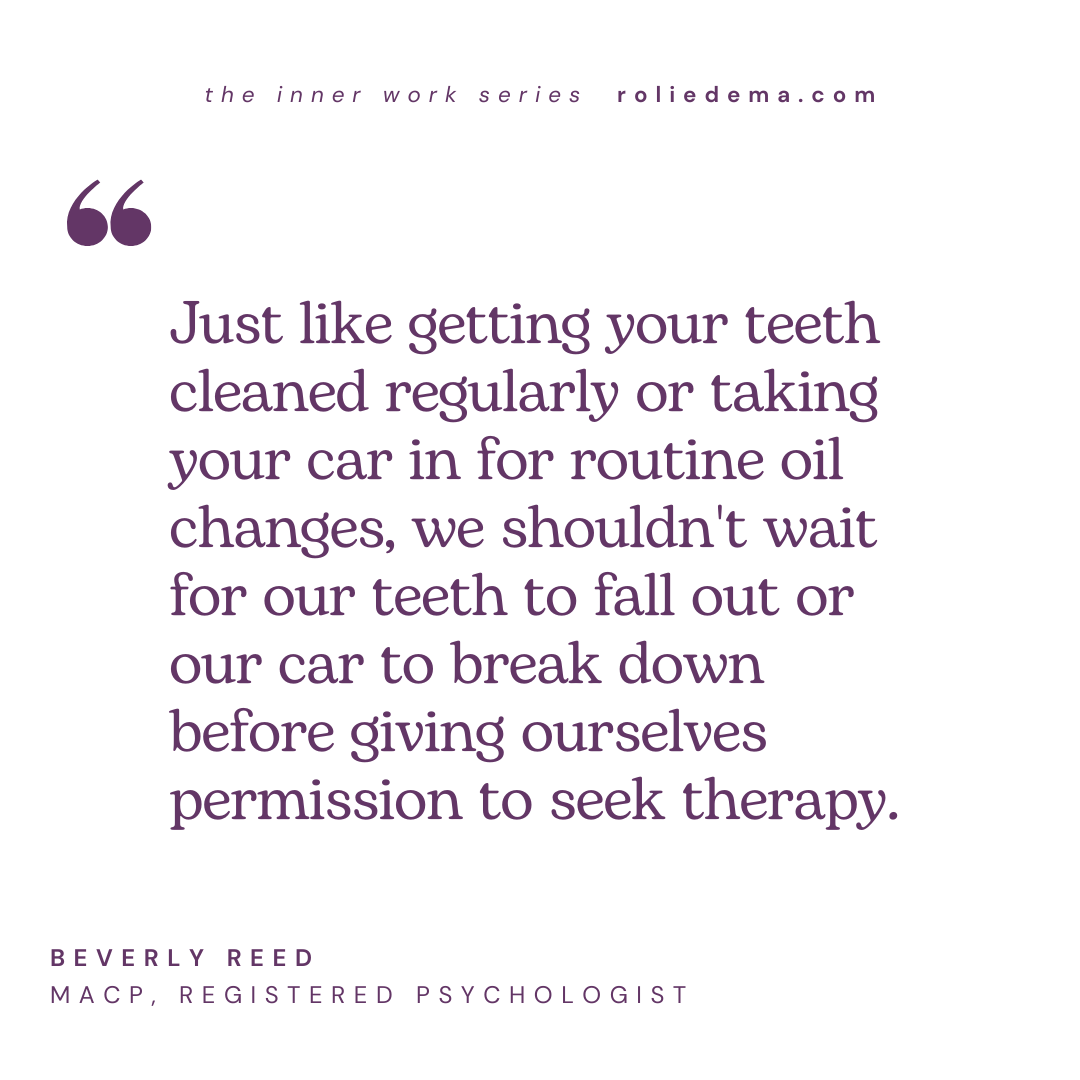- Home
- Think Pieces
- Interviews
- Inner Work Spotlight with Beverly Reed
Inner Work with Beverly Reed | Tap Into Your Values, Dreams & Purpose
In this spotlight interview, therapist Beverly Reed explains how to transition from disempowerment to a greater sense of empowerment and control over our lives.
Welcome to another edition of The Inner Work Series: What Therapists Want You to Know, a collection of short interviews that feature grounded wisdom from real therapists.
Today I'm honoured to feature Beverly Reed (MACP), a Registered Psychologist with experience helping adults with an array of concerns including anxiety, OCD, trauma, stress, boundaries, self-esteem, emotion regulation, and more.
This post may contain affiliate links. Please read my disclosure for more information.
Interview with Beverly Reed, Calgary Therapist

Q1. What’s one mindset shift you often help your clients make?
One of my favourite mindset shifts to support clients in making is the transition from disempowerment to a greater sense of empowerment and control over their lives.
This shift often involves moving from what we call an external locus of control to an internal locus of control, which essentially means changing the belief that life is something that happens to you (driven by luck, other people, fate, or circumstances) to the belief that you have personal power and influence over the direction your life takes.
In my experience, this shift tends to occur gradually over time; but when a client eventually steps into empowerment, it's incredibly fulfilling to witness. Their body language, energy, and joie de vivre completely transform.
Q2. What’s one small habit or daily action that helps with emotional resilience?
I truly can't rave enough about the positive impact of gratitude journaling on emotional resilience and overall well-being.
This might sound a bit woo-woo, but scientifically, practicing gratitude works by stimulating the release of neurotransmitters like dopamine and serotonin, which are associated with positive emotions and mood regulation.
Furthermore, gratitude journaling helps rewire the brain by strengthening positive neural pathways, making it easier to focus on the good and cope with adversity.
I personally like The Gratitude Journal or The Five Minute Journal, but any journal with your own gratitude prompts is just as effective.
Q3. What’s one question you wish more people asked themselves (or their therapist)?
Rather than focusing on one specific question, I encourage questions that tap into our values, dreams, and purpose.
These types of questions pair perfectly with the empowered, internal locus of control mindset mentioned above, and can also help someone enter that mindset if they aren't quite there yet.
Some questions you might ask yourself include:
- When you imagine your "ideal" and most meaningful life, what do you see? Who's there? Where are you? How are you spending your time?
- Now think about your answers to the above question. Why are these things meaningful to you?
- Reflect, and then make a list of recent times you felt fulfilled, at peace, excited, proud, happy, etc.
- From the list above, are there any common themes?
- List anything that exists in your current life that you never want to lose.
- Reflecting on all of the above, set a goal that will take you one step closer to your most ideal, values-centred life.
Q4. Recommend a favorite resource:
Some accessible resources I love are mediation apps like The Calm App and Insight Timer.
Q5. What’s one myth about therapy you’d love to bust?
One myth I hope we can collectively bust is that going to therapy implies weakness, and conversely, that being well and healthy means we shouldn't be in therapy.
In a perfect world, I'd love for therapy to be accessible to people through both good times and bad.
Just like getting your teeth cleaned regularly or taking your car in for routine oil changes, we shouldn't wait for our teeth to fall out or our car to break down before giving ourselves permission to seek therapy.
When things in life are running smoothly, it can be the perfect time to explore where you want to go next.
Find Beverly Reed
Enjoyed reading Beverly's insights and answers to the above questions? Please visit Beverly's website, bewellpsychology.ca and additional links below to connect with her and learn more about her work.
Beverly's Links:
Thanks for reading! If you liked this content, share with a friend:
Recent Articles
-
5 Things to Stop Doing If You Want to Feel More Fulfilled
Feb 21, 26 05:35 PM
Are you unintentionally engaging in behaviours that leave you feeling depleted and empty? Here are 5 things to stop doing if you want to feel more fulfilled. -
5 Subtle Habits That Quietly Transform Your Life Over Time
Jan 25, 26 08:21 PM
Progress towards the things that matter isn't usually loud or dramatic. Here are 5 subtle habits that quietly transform your life over time. -
Inner Work with Marcus Lynn | How to Make Change More Realistic
Jan 19, 26 06:24 PM
In this spotlight interview, therapist Marcus Lynn explains how we can begin to see emotions as information and make change more realistic in our lives.









